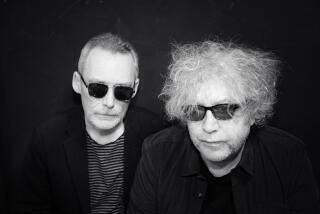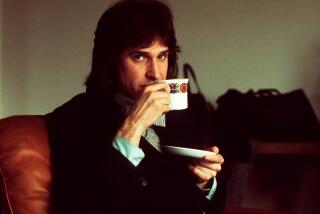The Doomsday Visionary of England’s Daisy Chainsaw : Pop music: Don’t call Katie Jane Garside pessimistic, however. ‘What I feel is a euphoric sense of doom,’ she says.
- Share via
“If you want to see the world, you’ve got about six years, I reckon,” warned Katie Jane Garside, the singer of the English band Daisy Chainsaw. Her doomsday prediction echoed punk-era no-futurism much the way the group’s musical abandon echoes punk’s fury.
“There are so many things raging that don’t have a solution,” she said during a phone interview this week from a tour stop in Atlanta (the band plays at SOMA in San Diego on Sunday and at the Whisky on Tuesday).
“Northern Ireland, there’s no way to solve that anymore. And the Gulf War, there’s no solution. And our planet--in an ecological sense--we’re killing her. AIDS, too.”
But Garside, 24, rejects the bleak cynicism that fueled punk in its glory days. “Nihilism amounts to nothing,” she said. “It’s funny, because in a way what I feel is a euphoric sense of doom. . . . There’s not a lot of time left and in our closing years we have to start on a personal level. It’s not a pessimistic thing.”
This curious, contrast-filled outlook can be traced to the fact that while Johnny Rotten et al. were railing against the state of the planet, she was circumnavigating it in a small boat with her sister and their hippie-generation parents.
“That was such a perfect childhood,” she said of the two-year adventure that began in 1980 in Poole on the south coast of England. “Up until recently I thought I saw too much too young. But now I feel truly lucky. It showed me how nice life could be and how it should be better for every person.”
After finishing school and moving to London six years ago, Garside hooked up with guitarist Crispin Gray. The two formed Daisy Chainsaw in 1989 and began releasing singles last year.
The music on the band’s recent debut album, “Eleventeen,” alternately attacks materialism and revels in chaos (several songs recall both Yoko Ono experiments and early Public Image). The songs were mostly written by Gray and recorded in quick sessions to capture the “contradictions” Garside says are essential to her vocal interpretations, not to mention her philosophy of life.
But the biggest contradictions--and certainly the biggest attention-getter--of Daisy Chainsaw are in Garside’s grooming. She generally wears formless, tattered dresses, is generally barefoot and often smudges herself with dirt. It’s literally a look of soiled innocence. In England, where the band was initially praised for its singles last year, it is also the source of controversy.
“I get accused of many things, promoting pedophilia and stuff like that,” Garside said. “I find that extraordinary. I dress myself like I would paint a picture. I try to use that to project how I feel inside.
“I’m a complete romantic as well, but within traditional romantic images you have so much blatant sexism. So it’s all those contradiction mixed up. But that’s OK. We should embrace all that (stuff) instead of tearing each other apart for it. That’s what I’m admitting to.”
More to Read
The biggest entertainment stories
Get our big stories about Hollywood, film, television, music, arts, culture and more right in your inbox as soon as they publish.
You may occasionally receive promotional content from the Los Angeles Times.









